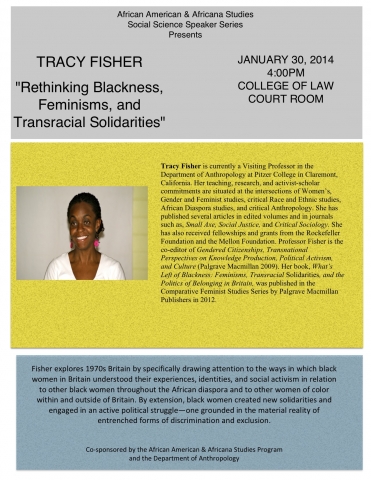1. Cosmopolitan Minstrelsy: Race, Gender and Trans-Atlantic Theatre (Dr. Zakiya Adair)
Reacting to American racist policies and post WWI access to international travel a flourish of African Americans migrated to Paris and London in the early 1920s. African American women entertainers found particular success in the genre of vaudeville. Josephine Baker, Mabel Mercer, Aida “Bricktop” Smith and Adelaide Hall are just a few of the popular African American women entertainers who became successful performing in trans-Atlantic vaudeville. As a form of popular entertainment, vaudeville had a long history in the United States and Europe. Originating in the late nineteenth century, vaudeville gained in popularity by featuring white women in both the male and female roles. However early incarnations of vaudeville in the United States did not feature African American performers and did not offer any radical challenges to constructions of race. Boarding ships bound for Europe, African American musicians, singers, dancers and artists made use of the modern availability of international travel and increased European interest for the consumption of American culture during the early twentieth century. The trans-Atlantic vaudeville that African American women performed in in the twentieth century was a composite of nineteenth century variety, blackface minstrelsy and burlesque.
The difference with trans-Atlantic black vaudeville or what I term, cosmopolitan minstrelsy was that the productions relied on colonial racial and gender tropes and constructions of nation in this vein trans-Atlantic vaudeville became a vehicle for transporting images of blackness. African American women performers were the main drivers of the genre and their popularity illuminates the significance of vaudeville to constructions of various identities. In 1925 Josephine Baker appeared in Caroline Dudley Reagan’s La Revue Negre in Paris, France and in 1928 Adelaide Hall appeared in Lew Leslie’s the Black Birds Revue in New York and Paris. Both of these productions became very popular in large part due to the theatrical spectacle created by Baker and Hall.
My goal with this essay is to map the development of theatrical constructions of black women both on the stage and in the iconography associated with their performances (playbills, advertisements, posters).
This paper will examine black American artists and their migration to Europe in the genre of early expressive culture. This paper will provoke a lively discussion on black internationalism and African American women’s negotiations of race, gender and class. Additionally this paper will deconstruct masculinist tendencies within scholarship on African American cultural history and performance.
2. New Directions: Madness, Politics Issues, and Aesthetic Practices in African American Literature in the 21st Century (Dr Therí A. Pickens)
In Victor Lavalle’s The Devil in Silver, the main protagonist, Pepper, must navigate daily life within the strictures of a mental institution after he is unjustly placed there as a way for local police officers to avoid the paperwork necessary for processing him traditionally. As he adjusts to the microcosmic world of the hospital, he begins to understand the relativity of craziness as defined by societal norms, on the one hand, and the inmates’ embodied realities, on the other. In this paper, I question the way madness informs the novel’s political and aesthetic practice.
Lavalle’s novel fits somewhat easily, though not neatly, into a black speculative fiction tradition, which deploys similar themes and aesthetic practices as mainstream (read: white) science fiction, horror, and alternative futurities. Often critics note the way these novels comment on or critique the current social and political issues that seep inside the porous boundary between book and world. I focus on the way Victor Lavalle’s Devil in Silver comments on the relationship between madness and the nation-state. Mad people are not allowed to be part of the citizenry. Yet, Pepper chooses to remain in the institution, in effect relinquishing his citizenship. The loss of his ability as property bears implications not only for how we understand the worth of citizenship, who desires it, and to whom it is available. Pepper’s decision challenges the teleological enterprise of the novel since he does not reach toward a resolution, but rather certain chaos.


